

4 Principles For Creating Change, And 4 Barriers That Make It Harder. Many people now are struggling to make change; to drive social or environmental impact whether they are social entrepreneurs or people working from within organizations to make a difference.
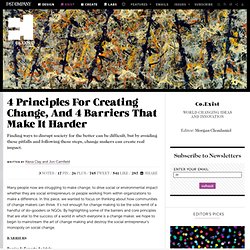
In this piece, we wanted to focus on thinking about how communities of change makers can thrive. It’s not enough for change making to be the sole remit of a handful of do-gooders or NGOs. By highlighting some of the barriers and core principles that are vital to the success of a world in which everyone is a change maker, we hope to begin to mainstream the art of change making and destroy the social entrepreneur’s monopoly on social change. Barrier 1: Experts As Idols Too often change making is outsourced to experts or social entrepreneurs rather than community members. Barrier 2: Conditions Of Problem Solving Are Overlooked Much of the time, we are quick to jump to tactical problem solving without fully reflecting on whether the conditions for it are put in place. Barrier 4: Learning Is One to One.
5 Characteristics of a Change Agent. Cc licensed ( BY ) flickr photo shared by visualpanic (change agents) – People who act as catalysts for change… In my work through school and organization visits, I have been fascinated to see the correlation between the speed of change and an individual who is “leading” the charge.

The schools that have someone (or a group of people) helping to push the boundaries of what can be done in schools seem to move a lot quicker with a larger amount of “buy-in” through the process. Change: 19 Key Essays on How the Internet Is Changing Our Lives. Change: 19 Key Essays on How the Internet Is Changing Our Lives, is the sixth issue of BBVA’s annual series devoted to explore the key issues of our time.
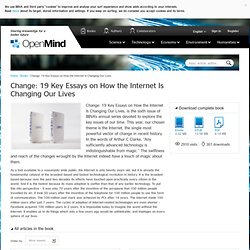
This year, our chosen theme is the Internet, the single most powerful vector of change in recent history. In the words of Arthur C Clarke, “Any sufficiently advanced technology is indistinguishable from magic.” The swiftness and reach of the changes wrought by the Internet indeed have a touch of magic about them. As a tool available to a reasonably wide public, the Internet is only twenty years old, but it is already the fundamental catalyst of the broadest based and fastest technological revolution in history.
It is the broadest based because over the past two decades its effects have touched upon practically every citizen in the world. Philosophy for change. Learning Philosophy of Change. Theory of Change Community. "Theory of Change" Theory of change. Theory of Change: A Collaborative Tool? ? Social Edge. We all have a whole boatload of different theories of change: change happens when the heart is deeply moved (people feel the injustice of racism) or when law demands it (Lyndon B.
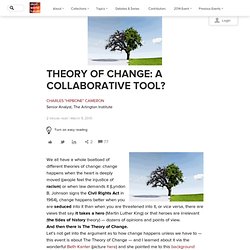
Johnson signs the Civil Rights Act in 1964), change happens better when you are seduced into it than when you are threatened into it, or vice versa, there are views that say it takes a hero (Martin Luther King) or that heroes are irrelevant (the tides of history theory) — dozens of opinions and points of view. Free Organizational Change Resources. Welcome. Theory of Change. There has been increasing interest around the world in the role that inclusive businesses, which engage and benefit the global poor, can play in the fight against the problems of poverty.
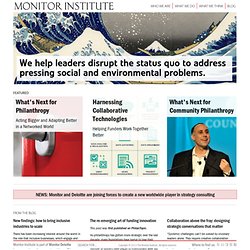
However, disappointingly few of these have achieved the scale required to make a significant difference. An analysis of over 400 such firms in Africa showed that a mere 13% of them had begun to scale. Now, in Beyond the Pioneer: Getting Inclusive Industries to Scale, our colleagues at Monitor Inclusive Markets share new findings that explain why this is the case, along with recommendations for how these problems can be overcome. MORE ›› This post was first published on PhilanTopic. As philanthropy has gotten more strategic over the last decade, many foundations have begun to lose their appetite for risk and experimentation. “Systemic challenges can’t be solved by visionary leaders alone. Category:Change management. Changement. Un article de Wikipédia, l'encyclopédie libre.

Le changement désigne le passage d'un état à un autre. Change management. Change management is an approach to transitioning individuals, teams, and organizations to a desired future state.[1] In a project management context, change management may refer to a project management process wherein changes to the scope of a project are formally introduced and approved.[2][3] History[edit] 1960s[edit] Everett Rogers wrote the book Diffusion of Innovations in 1962.
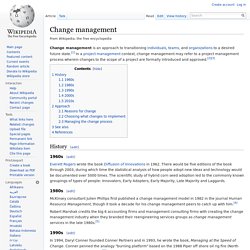
There would be five editions of the book through 2003, during which time the statistical analysis of how people adopt new ideas and technology would be documented over 5000 times. The scientific study of hybrid corn seed adoption led to the commonly known groupings of types of people: Innovators, Early Adopters, Early Majority, Late Majority and Laggards. 1980s[edit] McKinsey consultant Julien Phillips first published a change management model in 1982 in the journal Human Resource Management, though it took a decade for his change management peers to catch up with him.[4] 1990s[edit] 2000s[edit] 2010s[edit]